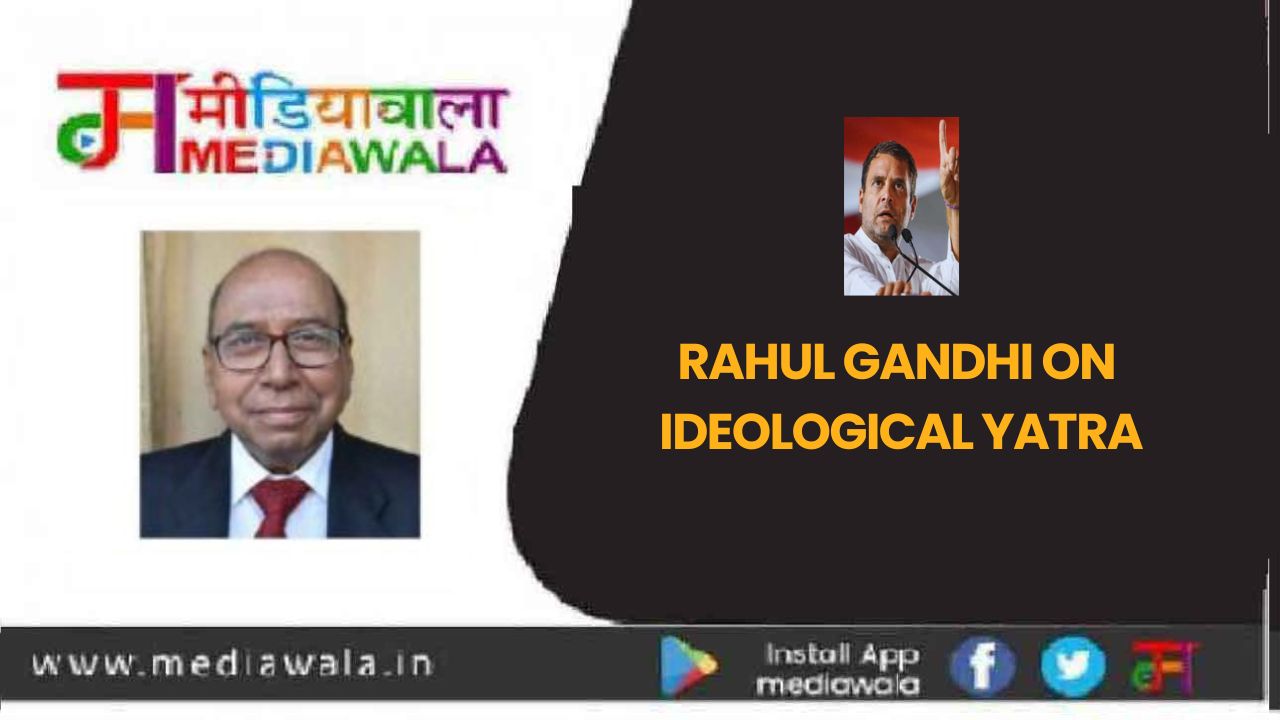

Rahul Gandhi on Ideological Yatra
Presently, Rahul Gandhi is on Bharat Jodo Nyay Yatra. Many times, Rahul Gandhi and his Yatra spokesperson, Jairam Ramesh have reiterated that this is not an electoral but an ideological voyage. The utterances of Rahul Gandhi are prominently left oriented and somewhat out of sync of Congress’s historical approach of centrist party leaning towards left. However, after 1991, Congress had followed the policy of liberalisation and globalisation. Rahul Gandhi decries accumulation of wealth in the hands of a few industrialists and has pointed out that half the wealth of India is in the hands of 22 industrialists. In a sharper attack, he has said that Modi has waived ₹16 lakh crore loan of the businessmen, but has not waved even one rupee of the farmers.
There is no denying that, in spite of being the fifth largest economy of the world, India is a poor country, with a capitalist economic structure. However, capitalist system is in now almost in every country of the world, including the communist countries like Russia and China. Regarding India, as per a 2017 study the private sector’s share in providing jobs had been over 90 percent, while it also contributed over 75 percent to domestic capital formation. As such, they enhance the GDP, per capita income, infrastructure, and quality of life. Govt on the other hand is spending heavily on infrastructure. India with its liberal and right-leaning policies in the last 30 years is rapidly growing and presently is the fastest growing major economy in the world. In the third quarter of this financial year, October to December, the GDP growth was impressive 8.4%. Rating agency Moody’s has revised its estimate of GDP growth from 6.1% to 6.8% for this financial year.
The wealth generated in India, obviously, does not go to every citizen in equal proportion. The rich are becoming richer. But this does not mean that the poor are not improving their lots. Latest household survey, though not very scientific, indicates that the abject poverty has reduced to less than 5%. 25 crore people have been brought out of poverty into lower middle class. Mass scale distribution of food grains, coupled with other welfare measures by taxpayers money has helped ease the difficulties of the lower strata.
In this yatra, Rahul has pledged that once in power, he will give MSP, as calculated by Swaminathan committee, to all farmers of India. Along with economic issues, Rahul has added the dimension of castes. He wants census of castes. This will put pressure on the demand for more reservation for different groups, putting the weakest at a disadvantage. Due to the unemployment, reservation is a very big attraction for the youth. Politically it is very tempting for political parties to arouse emotions for reservation. Politicians know fully well that there are hardly much government jobs available. Rahul has hinted to extend the reservation in the private sector. According to his calculation, 50% backward, 15% schedule caste, 8% schedule tribes and minorities constitute 90% of Indian population and they are all poor. Fact is that there are over 30% people in middle class, likely to rise to 40% shortly, dominating in production and consumption. Rahul criticises disinvestment in the public sector. Manmohan Singh had started disinvestment in public sector and present government is also trying to do the same. But in spite of some disinvestment, more persons are employed in the public sector today . Rahul Gandhi is highly critical of PPP model for constructing or renovating airports and seaports. But one should not forget that India’s most prestigious Indira Gandhi International Airport,Delhi during UPA II was a consortium of the GMR Group (50.1%), Fraport AG (10%) and Malaysia Airports (10%), India Development Fund (3.9%) and the Airports Authority of India retains a 26% stake.
Being in opposition gives an advantage of being populist without responsibility. No detail roadmap is expected from any opposition party in a democracy. It is for the public to trust the leader’s agenda. In present India, implementation of revolutionary left policies in a well established capitalist structure is not possible without anarchy or economic depression. However, past experience has shown that if the opposition comes to power, it becomes restrained and starts following the established policies on the same rails on which the previous government was rolling on.


एन. के. त्रिपाठी
एन के त्रिपाठी आई पी एस सेवा के मप्र काडर के सेवानिवृत्त अधिकारी हैं। उन्होंने प्रदेश मे फ़ील्ड और मुख्यालय दोनों स्थानों मे महत्वपूर्ण पदों पर सफलतापूर्वक कार्य किया। प्रदेश मे उनकी अन्तिम पदस्थापना परिवहन आयुक्त के रूप मे थी और उसके पश्चात वे प्रतिनियुक्ति पर केंद्र मे गये। वहाँ पर वे स्पेशल डीजी, सी आर पी एफ और डीजीपी, एन सी आर बी के पद पर रहे।
वर्तमान मे वे मालवांचल विश्वविद्यालय, इंदौर के कुलपति हैं। वे अभी अनेक गतिविधियों से जुड़े हुए है जिनमें खेल, साहित्यएवं एन जी ओ आदि है। पठन पाठन और देशा टन में उनकी विशेष रुचि है।






